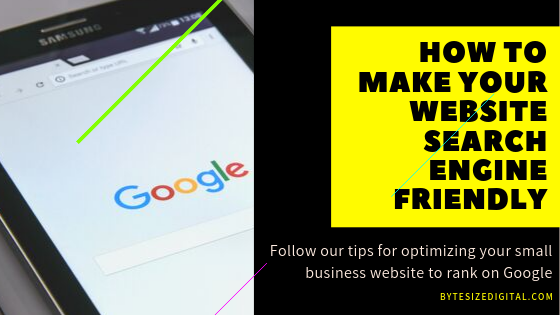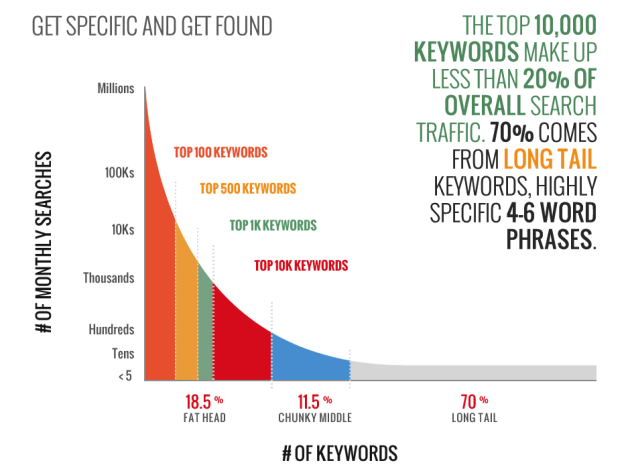Whether you’ve just launched a new website or have had one for years, your work is never done when it comes to optimizing and adding new content. The best way to get website traffic is make sure it’s search engine-friendly. Search engine optimization (SEO) is the secret weapon for small businesses to get noticed online by search engines and potential customers. Search engines like Google and Bing reward websites that follow certain criteria by moving them up higher in search results, making it much easier for your customers to find you!
How it works
There are millions of websites on the internet, so how will your website rank high? Search engines use complex algorithms to determine which websites should match certain keyword terms that users search. The best part about this, is that Google doesn’t prioritize results based on size or popularity of a company. It’s an even playing field for all websites. Unfortunately for most, high rankings don’t happen magically. It takes research, hard work, and optimization to crack the code and rank on Google. There are a few important website tips for SEO you can make sure you’re doing to have a search engine-friendly website.
Making your website search engine-friendly
Keyword research
Search engines are all about keywords – what a user is going to type into a search engine to find your business. Whether that’s “contractors near me” or “best web design in philly”, you want to make sure your website is showing up when a visitor types in something relevant to your business! If you’ve never done keyword research before, you’re not alone! Luckily, it’s simple to start your keyword planning to find popular phrases and keywords relevant to your business. A good free resource is the Google Ads Keyword Planner. This tool makes it easy to search for keywords and find others that users are searching, categorized by competition level and average monthly searches. When doing keyword research, don’t discount long-tail keywords!
Write valuable content
Every small business should have a blog! It’s the easiest way to use your keywords and ensure that your website is being updated with fresh content often. Search engines like Google, reward websites that update their content frequently. A weekly or monthly blog post can go a long way. Not to mention, the point of your website should be to answer potential customers questions or help them find something they need. What better way to do that than with a blog?
Optimize existing pages and URLs with keywords
Just as you’d use keywords in your blogs, you should also be optimizing your existing pages and page URLs with keywords (ex: https://www.bytesizedigital.com/best-website-building-tips). Pro tip: do not stuff keywords in places where they don’t make sense! Make it sound natural. Google’s algorithms are smart enough to see through keyword stuffing and may not offer your website in search results.
Use internal and inbound links
Another great way to rank on Google is through internal and inbound links. Internal links are easy. Throughout a blog post or on a page of your website, link to other relevant pages within your website. Not only will this take interested visitors throughout your website, it will also allow Google to crawl through your website easier and hopefully rank you higher!
Inbound links are a little harder to come by. If a website like Buzzfeed (or any other website with a lot of traffic) were to write an article and link to your website, that’d be a huge boost in traffic for you, and it’d be an indicator to Google that your site has valuable information and you’d rank higher. Check out this helpful article from Hubspot on Inbound Link Building.
Make sure your website loads fast
No one likes to wait for a slow website to load. Oftentimes, users will immediately exit the page and move on to another website. Google will also notice that your website takes too long to load and will not offer it in search engine results. Don’t let that happen to you! Make sure your image and video files aren’t too large so they load quickly. Check out these tips for improving page load time and overall speed.
Take advantage of social media
So many small businesses are missing a huge opportunity by not taking advantage of social media. Not only do social media account build your trustworthiness, they’re also the perfect medium to share your blog and website content! If Google isn’t giving you the rankings you hoped for, use social media to share your message. Social media puts your content right in the faces of the people that care about your business the most. Your social media followers followed you because they like your business! If you’re sharing valuable content, hopefully your followers will want to share it with their followers as well.
Extra resources
-
Not sure if your website is SEO-friendly? Use this resource from powermapper.com to get a full report on your website.
-
Working on WordPress? Download the Yoast SEO plugin to easily add keywords and optimize your content on every page.
When it comes to SEO, the best thing to do is just wait. Rankings aren’t going to happen overnight after posting one blog. It could take months or even a year to start seeing rankings. Don’t get discouraged! Keep producing valuable content and you’ll be on your way to a top ranking. Need more help with SEO? Check out our blog on basic SEO every small business needs. As always, if you need help or have any questions, feel free to reach out to us!



